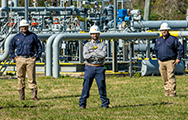About this report
Selecting the topics
The 2020 Sustainability Report, published on April 7, 2021, is our 24th such report. It focuses on the key sustainability challenges and opportunities we face and how we are responding. It details our social, safety and environmental performance in 2020.
The topic selection process identifies the sustainability subjects that were most relevant to Shell and our stakeholders or were prominent globally in 2020.
Each year we use a structured process to select the report’s content. We engage with various groups and individuals to understand specific concerns about our business and its impact, particularly relating to the environment and society. We consider the views of others such as non-governmental organisations, customers, the media, academics, investors and employees.
We gather opinions and advice in various ways, including formal and informal meetings, surveys and research. Input from our Report Review Panel of independent experts helps to ensure that coverage is balanced, relevant and complete.
This report includes the topics that were a priority for Shell in 2020. Topics that consistently ranked of higher importance related to energy transition and climate change, business ethics, transparency and corporate governance.
The main steps involved in selecting topics were:
- identify and understand topics that are important to our stakeholders and our strategy;
- collate the topics identified as being of high importance;
- identify the topics that will be covered on www.shell.com;
- consider input from our Report Review Panel to ensure that coverage is balanced, relevant and complete; and
- inform Shell’s Executive Committee of the topics, for its endorsement.
External voices
Several individuals have shared informed views on Shell’s activities, published under the header “External voices”. These quotes are intended to give independent perspectives on our activities. They typically come from a range of organisations in areas such as civil society, academia, contracting and supply, community leadership, as well as customers and people living or working near our facilities. They also reflect some of the different regions where we operate and some of our businesses and projects. The views expressed are those of the individual and do not represent views held by Shell. Contributors are not remunerated.
Reporting guidelines
We report in line with guidelines developed by IPIECA, the global oil and gas industry association for advancing environmental and social performance. This report has been prepared in accordance with the Global Reporting Initiative (GRI) Standards: Core option (see GRI index for full details). It is also the document we use to communicate our progress in supporting the principles of the UN Global Compact.
As a member of the World Business Council for Sustainable Development, we support the organisation’s updated criteria for membership from 2022, which includes requirements for corporate transparency.
The recommendations of the Task Force on Climate-related Financial Disclosures (TCFD) help to guide and inform our reporting in our Sustainability Report and Annual Report.
In January 2021, we agreed to adopt the Stakeholder Capitalism Metrics, a set of environmental, social and governance metrics released by the World Economic Forum and its International Business Council.
More detailed information about how we report is available at www.shell.com/sustainability/sustainability-reporting-and-performance-data/voluntary-reporting-standards-and-esg-ratings
Report Review Panel
We use an external review panel to strengthen our sustainability reporting. The panel helps evaluate and improve the quality and credibility of our Sustainability Report. The 2020 Report Review Panel comprised five sustainability and corporate reporting experts:
- Mandy Kirby, UK. Chief Strategist and Co-founder, City Hive (Chair of the Report Review Panel)
- Andrew Logan, USA. Senior Director, Oil and Gas, Ceres
- Changhua Wu, China. Chief Executive Officer, Beijing Future Innovation Center
- Hilary Parsons, UK. Formerly Head of Creating Shared Value Engagement, Nestlé
- Vanessa Zimmerman, Australia. Chief Executive Officer, Pillar Two
The panel provided input into our topic selection process. They reviewed the report, discussed Shell’s reporting and spoke to relevant Shell employees to prepare their statement. The panel’s mandate focused on the quality of Shell’s reporting, including credibility, completeness and responsiveness.
Panel members are offered an honorarium for their input.
You can read more about the panel members at www.shell.com/sustainability-report-review-panel
Report Review Panel recommendations
Focus on strategic priorities
2019 recommendations
More clearly articulate how Shell’s sustainability priorities intersect with its core business strategy to drive decisions, such as resource allocation and prioritisation.
How Shell responded in 2020
The 2020 report organises content under the four main goals of Shell’s Powering Progress business strategy – generating shareholder value, achieving net-zero emissions, powering lives and respecting nature – and our core values of honesty, integrity and respect for people and our focus on safety (see Sustainability at Shell).
2019 recommendations
More effectively convey the big picture of Shell’s place in society – including both risks and opportunities, and how business can help address society’s most pressing challenges.
How Shell responded in 2020
You can read case studies and commentary about Shell’s progress in creating value for wider society, including our response to challenges related to climate change, the environment, diversity and inclusion, and human rights. In 2020, Shell worked to assist in the global response to the COVID-19 pandemic (see Shell's response to COVID-19). See also Letter from the CEO.
2019 recommendations
Engage readers who are not sustainability experts but are concerned about material issues such as climate change and ecological integrity.
How Shell responded in 2020
We continue to improve the relevance and readability of the report by clearly describing Shell’s role in addressing global challenges. This includes details of our Powering Progress business strategy, which builds on Shell’s long-standing commitment to contribute to sustainable development (see Sustainability at Shell).
We have also increased the number of links within the report, including to www.shell.com, and improved the topic selection filter on the homepage to direct readers more easily to relevant content.
Measuring sustainability performance
2019 recommendations
Further improve the balance of the report by articulating in more depth the potential challenges facing key business areas. Provide more context and explanation for the metrics so that readers are better able to assess changes in performance and progress.
How Shell responded in 2020
We focused on improving the quality of performance commentary for data tables in the report, seeking to ensure it is complete, balanced and fair. You can find commentary on the factors that influence our performance, including explanations for relevant graphs, within the safety, environment and social performance sections.
2019 recommendations
Develop new ways to measure and convey the impact of the steps Shell is taking to evolve its safety culture.
How Shell responded in 2020
In 2020, we started to deploy our refreshed approach to safety. We plan to report on a new metric (from 2021) which will measure our performance in serious injury and fatal incidents. It has a more consistent focus across the organisation on the way people, culture, equipment, work systems and processes all interact (see Our approach to safety and Process safety).
2019 recommendations
Share more information on how and when Shell pursues sustainability-related partnerships and how their impact is measured.
How Shell responded in 2020
You can find information about our extensive work with others in Collaborations and stakeholder engagement, as well as case studies and details of new initiatives across the report. See also Social and Environmental partners.
2019 recommendations
Further improve the balance of the report by including more diverse and critical points of view from independent voices.
How Shell responded in 2020
We continue to include independent views on our activities, from a broad range of organisations and individuals outside Shell.
Report Review Panel opinion
The Report Review Panel issues the following independent statement on Shell’s 2020 Sustainability Report.
“We have had the opportunity to review two drafts of the 2020 Sustainability Report and provided both written and verbal feedback to Shell in relation to the quality of sustainability reporting. During this process, Shell has been responsive to feedback, providing clarifications on language and approach.
Following the panel’s review of the 2019 Sustainability Report, Shell has pursued further efforts to make content accessible to all readers, while serving the individual needs of its diverse stakeholders. We welcome the clear language and structure this year, and the effort to frame the majority of sections with a mixture of accessible content, contextual diagrams and more detailed technical terminology.
The panel acknowledges the significant global challenges in 2020 caused by the COVID-19 pandemic and the impact on business and data collection. Shell was responsive to suggestions that the report clearly communicate its efforts to address the pandemic in relation to its operations and suppliers, and the broader context of its role in society.
Clarity of reporting has improved in many areas, including its strategic approach and improved framing of metrics with contextual information, as recommended by the panel in 2019. The explicit connection between sustainability strategy and the actions taken by Shell could be strengthened by featuring more case studies.
The panel welcomes Shell’s expanded transparency efforts, in particular around tax and remuneration.
We commend the improvements in safety culture and reporting. We would encourage Shell to explore opportunities for greater use of forward-looking metrics with its disclosure, for example, on process safety where current disclosure consists entirely of lagging indicators.
Shell has the potential to become a leader in evolving areas of sustainability disclosure, particularly water – where localised, context-based reporting is key to understanding a company’s impact – and strategies to reduce greenhouse gas emissions. There are areas where strategy remains less evident, notably renewable energy and, in a broader context, systemic changes and opportunities of the energy transition.
We recognise that there was reduced opportunity for stakeholder engagement during the 2020 reporting period, not least the difficulty of in-person contact. While we are aware of Shell’s efforts to engage with a wide range of stakeholders and to include diverse external voices in the report, the panel would welcome more details on Shell’s engagement across sustainability topics, particularly challenges that have emerged and how they have been addressed. We appreciated that Shell included information on its implementation of international standards, including those relating to human rights.
This report more clearly sets out Shell’s approach to the UN Sustainable Development Goals and their consideration in its business. We welcome Shell’s articulation of its responsibility and role in society, including its acknowledgement that further changes to its business plans will be needed to meet its sustainability goals. This will become more relevant as society’s efforts to move towards a net-zero emissions future imply changes to energy production and supply, and as standards around sustainability continue to evolve.
In the future, the panel would hope to see more detail on Shell’s supply chain strategy and its use of new and existing technologies and how these contribute to the pace of change of the energy transition.
We would like to thank Shell for the opportunity to share our feedback here and throughout the drafting process and we look forward to reading the next Shell Sustainability Report.”




